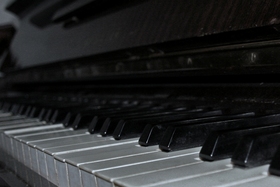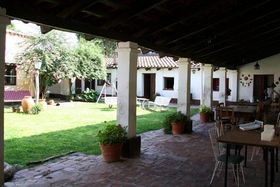
Last photo
Chile or Bolivia?…>>
11-04-2007
The Casona de Coronel Moldes is oldest house in the village. 1694. It keeps an austere rustic decoration, dark, of heavy wooden blinds and a huge collection of antique objects spread throughout the big bedrooms and living rooms. In one of them, abandoned at a wall, a Burmeister with stiff notes, brought recently. I took the opportunity to stretch my rusty fingers, as there were no other guests. The owners were delighted, because in truth no one there could play. Then I had breakfast at the porch that led to the inside patio and enjoyed the beautiful morning in no hurry.
Back to the road, I crossed the mountain that separated me from the
Until Purmamarca the flat asphalt galloped through the plan announcing the famous Quebrada de Humahuaca, another piece of Human Heritage, here collecting another extremely rich Argentinean contribution. At the detour, the signs showed the indecision that would be solved a little later: to the left, Purmamarca,
The streets showed the afternoon rains in a dirty mud ill illuminated by the diffused orange of the town’s lampposts that projected deformed shapes on the brownish walls of the houses. In the dim light of a café, badly shaven men drank beer at simple dark wooden tables. I followed the next sign that led me through a steep street full of barefooted children running after a pierced football. I abandoned the engine to low rotations and let the bike stumble on the rocks and holes of the path. 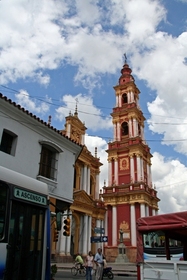
After checking in, I could park right outside the bedroom door, which always makes the overnight logistics easier. There was a bunk bed and two other beds over cheap tiled floor with a step leading to a smelly bathroom. Another room, another night, another stop before following my way. I know that the details I now see, the colour of this wood, there ragged blankets, these water stained walls, all this room will quickly evaporate from my memory into a general mix that represents all of these sleepovers. It’s much easier to remember the owners, every time I talk to them. And there are times that we talk a lot. Not this one, though.
I accompanied dinner with a wonderful Syrah-Cabernet Sauvignon. Starters, cheese, main course and a glass of quality wine, uncorked at that moment. Twelve pesos. For everything? Yes. For a moment I though I was making a mistake on my math, but I wasn’t. Twelve pesos are really three euros. I paid the bill. For a town like this, relatively touristic, it seemed an unbelievable price, even considering that we are at the northern limit of the country, no doubt the poorest region of 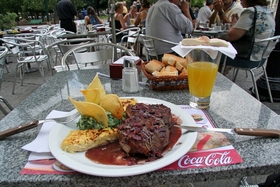 I stroll on foot, still not hungry enough to enter a restaurant. This part of the town looks better, it has a small scent of tourism. In a last hope to save the stage, I confirm over the internet the forecasts of rain and cold for
I stroll on foot, still not hungry enough to enter a restaurant. This part of the town looks better, it has a small scent of tourism. In a last hope to save the stage, I confirm over the internet the forecasts of rain and cold for 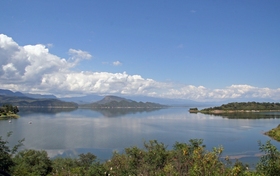
I returned to the hostal and to the dirty part of town. An old truck went by towing an even older car, while the suspension screeched passing the holes. Beyond the corner, at the dark alley, the children no longer played with the ball and three men leaned embarrassed over an open trunk, I seem to have seen something disappearing under the rug. It was my imagination, perhaps, that I fed trying to guess which border the car would cross. To be on the safe side, I walked faster.
Some thick drops of rain started to fall down and a strong lightening lighted everything white. The thunder came from far away, dragging itself in a rough muffled tremor. All of a sudden more lightening flashed and more thunders echoed and inside the bedroom the windows shook with the noise, sprinkled with the strong rain. The storm came in a hurry and in the same hurry it went away, leaving but a wet dirt smell that entered through the window. Everything calm once again, I fall asleep thinking of the great crossing of the following day.

